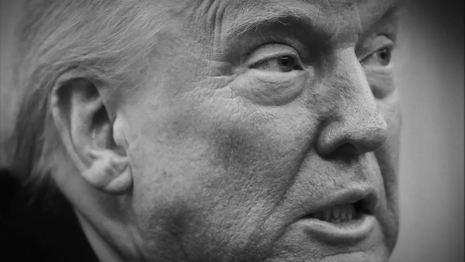Even as the Senate was preparing to take up defunding PBS, the taxpayer-funded network was shamelessly airing another Trump-trashing Frontline documentary on Tuesday evening.
The online blurb to “Trump’s Power and the Rule of Law" claimed to go "inside the high-stakes showdown between President Donald Trump and the courts over presidential power. Trump allies, opponents and experts talk about how he is testing the extent of his power; the legal pushback; and the impact on the rule of law.”
Hosted as usual by faceless narrator Will Lyman, this entry was even more explicitly anti-Trump than previous Frontline offerings. Although a few defenders like Steve Bannon and especially Trump advisor Mark Davis had their say, they were outnumbered, aligned against legacy media journalists on the anti-Trump side along with anti-Trump conservatives.
The first soundbite came from a Democrat, encapsulating the show's theme. Temidayo Aganga-Williams, a Democrat lawyer for Nancy Pelosi's January 6 committee, asked rhetorically “Do we have the rule of law or do we have royal decrees?”
The show proper opened with newly sworn-in President Trump at the Capital One arena, signing executive orders before enthusiastic supporters, a clip followed by comments from NPR journalist Susan Davis and longtime anti-conservative New Yorker journalist Jane Mayer.
Davis reappeared as a talking head to call January 6 “a violent attack on democracy.”
Later, narrator Lyman followed up on a quote from Barton Gellman of the liberal Brennan Center for Justice by comparing Trump to Richard Nixon.
Lyman: It was a familiar argument -- that a president was above the law. It went back more than 50 years to another president dogged by legal problems.
 When covering Trump's triumph at the Supreme Court in 2024 in a landmark ruling on presidential immunity from prosecution, Frontline portrayed the conservative justices and Trump himself with high-contrast forbidding black and white photography a not-too-subtle way to identify the villains.
When covering Trump's triumph at the Supreme Court in 2024 in a landmark ruling on presidential immunity from prosecution, Frontline portrayed the conservative justices and Trump himself with high-contrast forbidding black and white photography a not-too-subtle way to identify the villains.
In a discussion about Trump supposedly running roughshod over the post-Watergate attempts by Congress to box in the executive branch, Frontline maintained its standard procedure, pitting a legacy print journalist against a political activist, indicating Trump has no friends in the legacy press. (Click "Expand.")
Jane Mayer: After Watergate, there was an effort to reform the presidency and to put some constraints on it. A lot of ethics laws were passed, um, independent agencies were safeguarded. The whole effort was to fight corruption and to fight tyranny, to make sure that a president didn't become a tyrant.
John Yoo: Congress tried to take some power back. One way to think of it is, you know, Gulliver is the president. And then, after Watergate, what Congress did is, they tried to tie him down, just like the Lilliputians tried to tie down Gulliver....
Aganga-Williams appeared again, angry at Trump’s pardons of those convicted in the January 6 attack on the Capitol.
Aganga-Williams: People who attacked Congress, people who used violence to spread their political message, people who had no regard for our institutions and our democracy, that's who he was issuing pardons for.
A montage followed of convicted January 6 participants, shown in interviews followed by graphics showing their now-pardoned crimes.
Later, Lyman suggested “Trump and his advisers were pushing to go further-- exact retribution for what they called ‘lawfare.’” Yet "lawfare" turned out to be a pretty accurate description of Trump's treatment in the unending cascade of criminal cases, and voters seemed to agree.
Lyman found suddenly popular PBS presence, Judge J. Michael Luttig, a prominent conservative appeals court judge turned “vocal Trump critic.” Luttig was overwrought over Trump’s appearance with Attorney General Pam Bondi at the Department of Justice.
Luttig: I was shocked beyond words. Even after all that we've seen from the president over the past eight years, to watch him stand in the Great Hall of the Department of Justice, a sacred place in America, and claim that now he was going to get even by politicizing and weaponizing the Department of Justice and the FBI against his political enemies, was a travesty in all of American history.
The largest fraud the liberal media have uncorked in the Biden era is that there was no "politicizing and weaponizing the Department of Justice" until 2025.
The threat to PBS’s federal funding was brought up obliquely by Bannon (between profanities), while Lyman defended his employer's courage.
Bannon: ….PBS is gonna crater. You don't believe, actually, at your core, in what you're trying to do....
Lyman: PBS and NPR sued Trump over his attempts to defund them. Harvard also refused to back down....
The New York Times reporter/front-page editorialist Peter Baker claimed that under the Trump regime, he had “never seen people in Washington scared the way they are now…they are scared to talk, they are scared to pop their head up.” Frontline sure found plenty of them. One of them, the Democratic lawyer Aganga-Williams who opened the show, earned a closing statement, a longer version of his opener.
Aganga-Williams: The battle here may, on the face, be between Trump versus the courts, or Trump versus the rule of law, but this is the battle for, what is going to be normal in America, what are our norms? What is our system of government that we are all going to subject ourselves to? Do we have the rule of law or do we have royal decrees? That's what's at stake here.
The show featured a couple of strong defenders of Trump, but began and ended with Trump critics Aganga-Williams and Peter Keisler, associate attorney general under President George W. Bush




